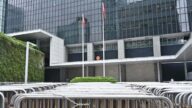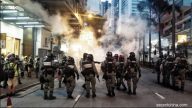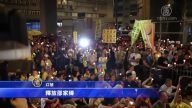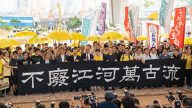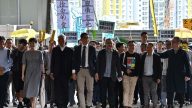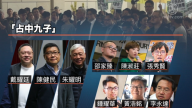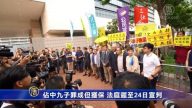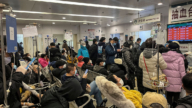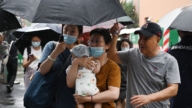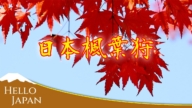【新唐人2014年06月26日讯】中共“国台办”主任张志军25号到台湾访问,并于桃园机场饭店举行“王张会”,场外抗议声不断。而台湾学运领袖林飞帆等人的赴港签证被拒,被怀疑是遭到中共政权及港府的刻意打压。台湾在野党也发声明,支持、声援香港人民对民主化的追求。
中共“国台办”主任张志军在6月25号抵达台湾访问,迎接他的除了台湾政府官员以外,还有一批民间社团的抗议人士。当天下午,他在饭店与台湾行政院大陆委员会主任委员王郁琦,举行第二次的两岸事务首长会议。
上午11点左右,被警力层层戒备维护的机场,群众爆发口角冲突。台湾《自由时报》描述“场面火爆!”有疑似黑道的年轻男子,突然向“台联党”人士挥拳,打完人后慌张跑走。
而今年3月,在台湾发生的反对《海峡两岸服务贸易协议》通过立法,并率领50万民众上街的“太阳花学运”领袖林飞帆和陈为廷,也前往张志军下榻的饭店。他们与民众在饭店外“举红牌”抗议,也和警方爆发了肢体冲突。
总部设于日本东京的时事评论杂志《外交官》(The Diplomat),形容张志军此行的“重要性”,被中国媒体宣传为“可比拟人类登上月球”,而事实是,张志军这次访台,恐怕会垄罩在台湾的“太阳花学运”气氛下。
《外交官》评论说,台湾自从爆发“太阳花学运”后,两岸情势有所改变,中共当局正在研究如何改变对台政策。作者写道:“这些会谈安排显示北京想扩大两岸关系的支持,不再只是和国民党官员或是台商交流。”但林飞帆批评,张志军应该和“太阳花学运”的参与者直接对话,才能知道台湾年轻人真正的心声。
据了解,陈为廷原定下周参加香港“七一大游行”,但上网申请香港签证时被拒。而林飞帆和学运领袖黄国昌尝试申请后也遭拒绝。
林飞帆25号凌晨在社交网站“脸书”贴文说:除了政治因素,并无任何拒绝他们入港的理由。他表示,中共曾用飞弹恫吓台湾总统直选,如今再以瘫痪香港媒体网路干扰民主。他说,他去香港是要以行动声援香港的全民投票行动。即便“阻挡了他们入港,也阻止不了港、台公民坚持追求民主与互相声援的信念。”
台湾立法院跨党派国际人权促进会会长尤美女:“香港人自己的民主要靠自己来争取。中国自己是联合国人权委员会的委员,但是它(中共) 却对于人权、对民主、对自由打压不已。所以在这里我们会觉得说,中国(中共)应该多听听人民的声音,也多听听香港人的声音,能够尊重香港人民的自决。”
有70多万香港民众日前参与了“让爱与和平占领中环”( Occupy Central with Love and Peace)“全民投票”活动,票选香港行政长官普选的方案。
台湾《品位生活》杂志摄影师司马日:“这次他们(香港)的公投,为什么有超过70万的香港人,他还愿意出来投票支持,明知道这样做没有什么实质上的效力,可是有一点他们比较清楚,就是说,他们用实际行动来表达对中共的不满。所以这次香港事件,其实我们台湾人有很多是很关心的,有可能它也会发生在台湾。”
台湾居民黄先生:“香港(人)还有投票(公投)的方式,他们展现他们的民主,但是大陆(13亿人)没有。”
台湾在野党“民主进步党”25号声明,北京在香港“公投”进行之前,发布了“一国两制在香港特别行政区的实践”白皮书,特别强调对香港拥有“全面管治权”,这样强硬作为形同推翻“两制”的承诺,不仅香港民众难以接受,更加深台湾人民对中国的反感。
声明还表示:“支持并声援香港人民对民主化的追求,也呼吁香港政府以及北京应尊重‘占中公投’所彰显的民意,并积极回应港人对于落实‘真普选’及民主改革的诉求。”
采访/陈汉 编辑/周平 后制/周天
Taiwan Civil Support to Hong Kong Democracy Movement
As the head official from Communist China’s Taiwan Affairs
Office visited Taiwan on June 25, protests were held
outside the hotel at Taoyuan Intl. Airport
where the official meeting took place.
Taiwanese student movement leader Fei-fan Lin was recently
refused a visa application to Hong Kong.
It is suspected that it was due to deliberate interference
from Beijing with Hong Kong government.
Taiwan’s opposition party also voiced their support
of the democratic movement in Hong Kong.
Taiwan Affairs Office Director Zhang Zhijun
arrived in Taiwan on June 25.
He was greeted by a number of Taiwanese officials,
as well as protestors.
In the afternoon, heads of the cross-strait Affairs Offices
Zhang Zhijun and Yu-chi Wang met for a second time.
Around 11:00 am, protestors at the airport broke into quarrel.
Taiwan’s Liberty Times described the scene as “explosive”,
after a young man suddenly punched a Taiwan Solidarity
Union protestor and ran away.
Fei-fan Lin and Wei-ting Chen, the two leaders
of Taiwan’s Sunflower student movement in March,
also broke into clashes with the police outside the hotel.
The Sunflower student movement was initiated
in opposition to the cross-strait trade pact.
Tokyo-based magazine, The Diplomat, describes how China’s
mouthpiece explicitly compared the importance of Zhang’s
Taiwan visit to that of the first moon landing, but in fact,
the Sunflower movement overshadows Zhang trip to Taiwan.
The Diplomat commented that Communist China”“has been
trying to determine how to modify its approach to cross-strait
relations” since the Sunflower student movement.
The Diplomat says the recent meetings are attempts
by Beijing to maximize public support for cross-strait relations
by widening its contacts“beyond the traditional connections
with KMT officials and business people”.
However Fei-fan Lin says Zhang should be willing to talk
directly with participants in the Sunflower Movement
to know the true voice of young people in Taiwan.
Wei-ting Chen was reportedly scheduled to participate
in Hong Kong’s July 1 parade, but was refused a visa.
Student movement leaders Fei-fan Lin and Guo-chang Huang
were also refused of visa applications to Hong Kong.
Fei-fan Lin wrote on his Facebook page: Other than political
reasons, there is no other reason to refuse their entry.
He says that the Communist regime once intimidated Taiwan’s
presidential election with missiles, and that now it interferes
with Hong Kong’s democracy movement via cyber attacks.
He says he wanted to visit Hong Kong to show his solidarity
with the referendum.
Even though the CCP has“blocked their entry into Hong Kong,
it could not block the persistent pursuit of democracy
and mutual support between Taiwan and Hong Kong”.
Mei-Nu Yu, Taiwanese member of parliament:“Democracy
for Hong Kong relies on the people obtaining it for themselves.
Though mainland China is a member of the United Nations
Commission on Human Rights, it suppress human rights,
democracy and freedom endlessly.
China (the CCP) should listen to its people’s voice,
to the needs of the Hong Kong people and respect their choice.”
More than 700,000 Hong Kongers participated in the Occupy
Central with Love and Peace“referendum” campaign, to show
their wish to their right to vote for Hong Kong Chief Executives.
Sima Ri, photographer for Taiwan-based Taste of life magazine:
“Why would more than 700,000 people in Hong Kong join
the referendum, knowing that it has no immediate effects?
That’s because their actions will clearly demonstrate their
dissatisfaction with the Communist regime.
To us in Taiwan, we care about the Hong Kong referendum,
because it could happen to Taiwan too.”
Mr. Wong, Taiwan citizen:“Hong Kongers can still express
their democracy with the referendum, but not the mainlanders.”
Taiwan’s opposition party, the Democratic Progressive Party,
issued a statement on the 25th, regarding Beijing’s white paper
on the one country two system policy in Hong Kong.
The statement says that the CCP’s claim to”comprehensive
governance rights" over Hong Kong is a betrayal of its
“one country, two systems” promise.
It’s not just Hong Kongers who find it unacceptable,
it also causes Taiwanese to greatly resent mainland China.
The opposition party also stated its support of and solidarity
with the people of Hong Kong who pursue democracy.
It called on the Hong Kong government and Beijing to respect
the people’s decision as shown in the referendum,
and be pro-active toward Hong Kongers’ demand
for genuine universal suffrage and democratic reform.
Interview/ChenHan Edit/ZhouPing Post-Production/ZhouTian


